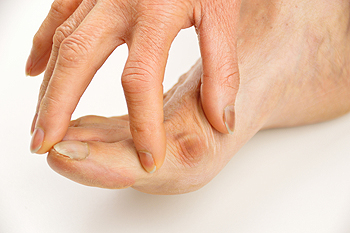 When the foot incurs abnormal pressure from wearing incorrect footwear, a corn may develop. A corn is a small area of thickened skin, usually appearing on the tops of the toes or the balls of the feet. These are typically referred to as hard corns, often producing redness, swelling, and pain. Soft corns are usually found between the toes, appearing white and having a rubbery texture. Both types of corns are produced by excessive friction, typically caused by wearing ill fitting shoes and from moisture accumulating between the toes. Many people will develop corns throughout their lives, and it is one of the most common foot ailments. It’s important to prevent corns from developing by being aware of specific areas of the foot that often endure pressure. If you stand for most of the day, it’s suggested to take ample time to find shoes that fit properly. Additionally, the skin will benefit significantly by being moisturized. Please consult with a podiatrist for a proper diagnosis and information on how painful corns can be removed.
When the foot incurs abnormal pressure from wearing incorrect footwear, a corn may develop. A corn is a small area of thickened skin, usually appearing on the tops of the toes or the balls of the feet. These are typically referred to as hard corns, often producing redness, swelling, and pain. Soft corns are usually found between the toes, appearing white and having a rubbery texture. Both types of corns are produced by excessive friction, typically caused by wearing ill fitting shoes and from moisture accumulating between the toes. Many people will develop corns throughout their lives, and it is one of the most common foot ailments. It’s important to prevent corns from developing by being aware of specific areas of the foot that often endure pressure. If you stand for most of the day, it’s suggested to take ample time to find shoes that fit properly. Additionally, the skin will benefit significantly by being moisturized. Please consult with a podiatrist for a proper diagnosis and information on how painful corns can be removed.
If you have any concerns regarding your Feet, contact Brent Harwood, DPM of Southeast Podiatry. Our doctor will treat your foot care needs.
Corns: What Are They? and How Do You Get Rid of Them?
Corns can be described as areas of the skin that have thickened to the point of becoming painful or irritating. They are often layers and layers of the skin that have become dry and rough, and are normally smaller than calluses.
Ways to Prevent Corns
There are many ways to get rid of painful corns such as wearing:
Treating Corns
Treatment of corns involves removing the dead skin that has built up in the specific area of the foot. Consult with Our doctor to determine the best treatment option for your case of corns.
If you have any questions please feel free to contact one of our offices located in Fairhope, Brewton, and Atmore, AL . We offer the newest diagnostic and treatment technologies for all your foot care needs.
Read more about Corns: What Are They, and How Do You Get Rid of Them As the aging process occurs, the cushioning in the feet becomes thinner and the nails can become brittle and dry. Sores on the feet may take longer to heal typically due to poor circulation, a common ailment in elderly people. Walking, stretching, and keeping the legs uncrossed are all beneficial in keeping the blood flowing freely. Feet generally become larger over time, and choosing shoes that avoid friction is necessary for a comfortable fit. There are several foot issues elderly people are most likely to experience, including athlete’s foot, dry skin, and ingrown toenails. These conditions may be prevented by washing and drying the feet thoroughly, especially in between the toes. When the toenails are properly trimmed, ingrown toenails may be avoided. Applying a moisturizer on the feet will not only feel good, but help keep the skin from getting dry. Please consult with a podiatrist if you have any questions regarding elderly foot care.
As the aging process occurs, the cushioning in the feet becomes thinner and the nails can become brittle and dry. Sores on the feet may take longer to heal typically due to poor circulation, a common ailment in elderly people. Walking, stretching, and keeping the legs uncrossed are all beneficial in keeping the blood flowing freely. Feet generally become larger over time, and choosing shoes that avoid friction is necessary for a comfortable fit. There are several foot issues elderly people are most likely to experience, including athlete’s foot, dry skin, and ingrown toenails. These conditions may be prevented by washing and drying the feet thoroughly, especially in between the toes. When the toenails are properly trimmed, ingrown toenails may be avoided. Applying a moisturizer on the feet will not only feel good, but help keep the skin from getting dry. Please consult with a podiatrist if you have any questions regarding elderly foot care.
Proper foot care is something many older adults forget to consider. If you have any concerns about your feet and , contact Brent Harwood, DPM from Southeast Podiatry. Our doctor can provide the care you need to keep you pain-free and on your feet.
The Elderly and Their Feet
As we age we start to notice many changes in our body, but the elder population may not notice them right away. Medical conditions may prevent the elderly to take notice of their foot health right away. Poor vision is a lead contributor to not taking action for the elderly.
Common Conditions
Susceptible Infections
Diabetes and poor circulation can cause general loss of sensitivity over the years, turning a simple cut into a serious issue.
If you have any questions please feel free to contact one of our offices located in Fairhope, Brewton, and Atmore, AL . We offer the newest diagnostic and treatment technologies for all your foot care needs.
Read more about Elderly and their Feet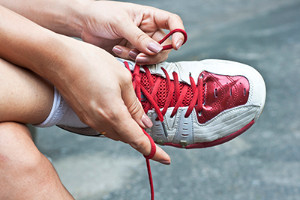 Proper support is crucial while running and is typically obtained through purchasing running shoes as opposed to shoes designed for walking. Running is considered a high impact sport, and it’s important to have the correct cushioned shoes to help promote proper balance. A firmer sole is important to a runner for maintaining stability, and a sole that’s more flexible is easier for a walker to wear as it grips the toe and the heel. Thick heels are preferred in running shoes as they provide proper cushioning and support for the jogger. If a walker should wear shoes made for running, they may experience conditions such as shin splints or Achilles tendons injuries. This is often because the mechanics of walking and running are different. Running shoes offer features designed to keep the foot in a neutral position and may provide more stability than walking shoes. An additional difference between the two types of shoes may be that running shoes are made of lighter materials that are meant to enable a jogger to move faster.
Proper support is crucial while running and is typically obtained through purchasing running shoes as opposed to shoes designed for walking. Running is considered a high impact sport, and it’s important to have the correct cushioned shoes to help promote proper balance. A firmer sole is important to a runner for maintaining stability, and a sole that’s more flexible is easier for a walker to wear as it grips the toe and the heel. Thick heels are preferred in running shoes as they provide proper cushioning and support for the jogger. If a walker should wear shoes made for running, they may experience conditions such as shin splints or Achilles tendons injuries. This is often because the mechanics of walking and running are different. Running shoes offer features designed to keep the foot in a neutral position and may provide more stability than walking shoes. An additional difference between the two types of shoes may be that running shoes are made of lighter materials that are meant to enable a jogger to move faster.
For more information about walking shoes versus running shoes, consult with Brent Harwood, DPM from Southeast Podiatry. Our doctor can measure your feet to determine what your needs are and help you find an appropriate pair of footwear.
Foot Health: The Differences between Walking & Running Shoes
There are great ways to stay in shape: running and walking are two great exercises to a healthy lifestyle. It is important to know that running shoes and walking shoes are not interchangeable. There is a key difference on how the feet hit the ground when someone is running or walking. This is why one should be aware that a shoe is designed differently for each activity.
You may be asking yourself what the real differences are between walking and running shoes and the answers may shock you.
Differences
Walking doesn’t involve as much stress or impact on the feet as running does. However, this doesn’t mean that you should be any less prepared. When you’re walking, you land on your heels and have your foot roll forward. This rolling motion requires additional support to the feet.
Flexibility – Walking shoes are designed to have soft, flexible soles. This allows the walker to push off easily with each step.
If you have any questions, please feel free to contact one of our offices located in Fairhope, Brewton, and Atmore, AL . We offer the newest diagnostic and treatment technologies for all your foot care needs.
Read more about Differences between Walking and Running Shoes Falls among people aged 65 or older can be extremely serious and are considered a leading cause of injuries in that age group. A fall can be hard in lots of ways, and people may become depressed after experiencing one. This can result in lacking the desire to stay active. There are several things to be aware of in the aging person, including their vision becoming weaker, causing objects to become harder to see; this may possibly lead to a fall. Some medications may cause dizziness and dehydration, which may also be responsible for a fall occurring. It may be beneficial to ask older people when their last eye exam was and to ensure that their eyeglass prescription is current. Discussing medications currently being taken may be advised to identify any potential drug interactions; drug interactions can possibly cause an imbalance and contribute to a potential fall. Typically, checking the lighting in the home, in addition to having secure rails on the stairway and installing bars in the tub area, may all be effective ways in preventing falls in the home.
Falls among people aged 65 or older can be extremely serious and are considered a leading cause of injuries in that age group. A fall can be hard in lots of ways, and people may become depressed after experiencing one. This can result in lacking the desire to stay active. There are several things to be aware of in the aging person, including their vision becoming weaker, causing objects to become harder to see; this may possibly lead to a fall. Some medications may cause dizziness and dehydration, which may also be responsible for a fall occurring. It may be beneficial to ask older people when their last eye exam was and to ensure that their eyeglass prescription is current. Discussing medications currently being taken may be advised to identify any potential drug interactions; drug interactions can possibly cause an imbalance and contribute to a potential fall. Typically, checking the lighting in the home, in addition to having secure rails on the stairway and installing bars in the tub area, may all be effective ways in preventing falls in the home.
Preventing falls among the elderly is very important. If you are older and have fallen or fear that you are prone to falling, consult with Brent Harwood, DPM from Southeast Podiatry. Our doctor will assess your condition and provide you with quality advice and care.
Every 11 seconds, an elderly American is being treated in an emergency room for a fall related injury. Falls are the leading cause of head and hip injuries for those 65 and older. Due to decreases in strength, balance, senses, and lack of awareness, elderly persons are very susceptible to falling. Thankfully, there are a number of things older persons can do to prevent falls.
How to Prevent Falls
Some effective methods that older persons can do to prevent falls include:
Falling can be a traumatic and embarrassing experience for elderly persons; this can make them less willing to leave the house, and less willing to talk to someone about their fears of falling. Doing such things, however, will increase the likelihood of tripping or losing one’s balance. Knowing the causes of falling and how to prevent them is the best way to mitigate the risk of serious injury.
If you have any questions, please feel free to contact one of our offices located in Fairhope, Brewton, and Atmore, AL . We offer the newest diagnostic and treatment technologies for all your foot care needs.
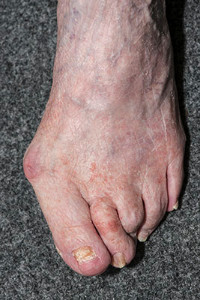 A large piece of bone protruding on the top or side of the foot may be referred to as a bunion. It’s often the result of inflammation of the tissues surrounding the big toe, in addition to the bones and tendons not lining up correctly. Narrow and high-heeled shoes are a common cause of bunions, which may become larger as time progresses and can possibly cause conditions like bursitis and arthritis. Symptoms can include tingling or numbness of the big toe, nerve irritation, and severe pain. Common bunions typically don’t require an exam, and most will be managed by applying cold therapy, wearing shoes with cushioned pads, and possibly taking anti-inflammatory medications. Surgery may be an option to consider if the pain is persistent or is affecting the quality of your life. A consultation with a podiatrist is advised for treatment of this condition.
A large piece of bone protruding on the top or side of the foot may be referred to as a bunion. It’s often the result of inflammation of the tissues surrounding the big toe, in addition to the bones and tendons not lining up correctly. Narrow and high-heeled shoes are a common cause of bunions, which may become larger as time progresses and can possibly cause conditions like bursitis and arthritis. Symptoms can include tingling or numbness of the big toe, nerve irritation, and severe pain. Common bunions typically don’t require an exam, and most will be managed by applying cold therapy, wearing shoes with cushioned pads, and possibly taking anti-inflammatory medications. Surgery may be an option to consider if the pain is persistent or is affecting the quality of your life. A consultation with a podiatrist is advised for treatment of this condition.
If you are suffering from bunions, contact Brent Harwood, DPM of Southeast Podiatry. Our doctor can provide the care you need to keep you pain-free and on your feet.
What Is a Bunion?
A bunion is formed of swollen tissue or an enlargement of boney growth, usually located at the base joint of the toe that connects to the foot. The swelling occurs due to the bones in the big toe shifting inward, which impacts the other toes of the foot. This causes the area around the base of the big toe to become inflamed and painful.
Why Do Bunions Form?
Genetics – Susceptibility to bunions are often hereditary
Stress on the feet – Poorly fitted and uncomfortable footwear that places stress on feet, such as heels, can worsen existing bunions
How Are Bunions Diagnosed?
Doctors often perform two tests – blood tests and x-rays – when trying to diagnose bunions, especially in the early stages of development. Blood tests help determine if the foot pain is being caused by something else, such as arthritis, while x-rays provide a clear picture of your bone structure to your doctor.
How Are Bunions Treated?
If you have any questions, please feel free to contact one of our offices located in Fairhope, Brewton, and Atmore, AL . We offer the newest diagnostic and treatment technologies for all your foot care needs.
Read more about Bunions A common ailment that many diabetics have are foot problems; managing blood glucose levels, however, may help to keep the feet healthy. When nerve damage occurs in diabetics, it may cause pain and tingling, including possible numbness in the foot. Serious infections may be the result of this and can possibly lead to gangrene. It’s important to manage your diabetes; this may involve following a foot care plan. It’s crucial to check your feet daily, which will enable you to notice problems before they get worse. Some conditions to look for may be cuts, sores, or ingrown toenails. Washing your feet regularly will help you become aware of these issues. Trimming the toenails straight across the toe with clippers can help prevent the skin from being cut and can keep the toenails healthy. Consult with a podiatrist for a proper diagnosis and to learn of the treatment options available for diabetic feet.
A common ailment that many diabetics have are foot problems; managing blood glucose levels, however, may help to keep the feet healthy. When nerve damage occurs in diabetics, it may cause pain and tingling, including possible numbness in the foot. Serious infections may be the result of this and can possibly lead to gangrene. It’s important to manage your diabetes; this may involve following a foot care plan. It’s crucial to check your feet daily, which will enable you to notice problems before they get worse. Some conditions to look for may be cuts, sores, or ingrown toenails. Washing your feet regularly will help you become aware of these issues. Trimming the toenails straight across the toe with clippers can help prevent the skin from being cut and can keep the toenails healthy. Consult with a podiatrist for a proper diagnosis and to learn of the treatment options available for diabetic feet.
Diabetic foot care is important in preventing foot ailments such as ulcers. If you are suffering from diabetes or have any other concerns about your feet, contact Brent Harwood, DPM from Southeast Podiatry. Our doctor can provide the care you need to keep you pain-free and on your feet.
Diabetic Foot Care
Diabetes affects millions of people every year. The condition can damage blood vessels in many parts of the body, especially the feet. Because of this, taking care of your feet is essential if you have diabetes, and having a podiatrist help monitor your foot health is highly recommended.
The Importance of Caring for Your Feet
Patients with diabetes should have their doctor monitor their blood levels, as blood sugar levels play such a huge role in diabetic care. Monitoring these levels on a regular basis is highly advised.
It is always best to inform your healthcare professional of any concerns you may have regarding your feet, especially for diabetic patients. Early treatment and routine foot examinations are keys to maintaining proper health, especially because severe complications can arise if proper treatment is not applied.
If you have any questions please feel free to contact one of our offices located in Fairhope, Brewton, and Atmore, AL . We offer the newest diagnostic and treatment technologies for all your foot care needs.
Read more about How to Care for Diabetic Foot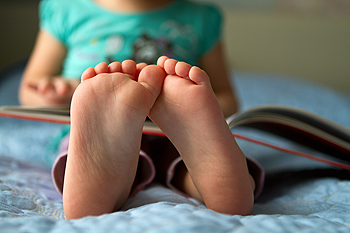 Athlete’s foot is a fungal infection that affects the skin on the foot. While generally not a serious condition, it can be bothersome and is contagious. As a parent, making sure your children maintain proper foot care is an important step in preventing ailments like athlete’s foot. Here are some steps that you should teach your children to help prevent athlete’s foot. Make sure that they wear flip-flops or sandals in public bathrooms and around pools. When they are drying their feet, make sure they dry in between their toes, as athlete’s foot often occurs in this area. Keep your house and their play areas clean. Teach them to not share some items like towels or shoes, as these items may be contaminated already. Finally, check their feet for any symptoms of athlete’s foot such as redness, itchiness, or scaly skin.
Athlete’s foot is a fungal infection that affects the skin on the foot. While generally not a serious condition, it can be bothersome and is contagious. As a parent, making sure your children maintain proper foot care is an important step in preventing ailments like athlete’s foot. Here are some steps that you should teach your children to help prevent athlete’s foot. Make sure that they wear flip-flops or sandals in public bathrooms and around pools. When they are drying their feet, make sure they dry in between their toes, as athlete’s foot often occurs in this area. Keep your house and their play areas clean. Teach them to not share some items like towels or shoes, as these items may be contaminated already. Finally, check their feet for any symptoms of athlete’s foot such as redness, itchiness, or scaly skin.
Athlete’s foot is an inconvenient condition that can be easily reduced with the proper treatment. If you have any concerns about your feet and ankles, contact Brent Harwood, DPM from Southeast Podiatry. Our doctor will treat your foot and ankle needs.
Athlete’s Foot: The Sole Story
Athlete's foot, also known as tinea pedis, can be an extremely contagious foot infection. It is commonly contracted in public changing areas and bathrooms, dormitory style living quarters, around locker rooms and public swimming pools, or anywhere your feet often come into contact with other people.
Solutions to Combat Athlete’s Foot
Athlete’s foot can cause many irritating symptoms such as dry and flaking skin, itching, and redness. Some more severe symptoms can include bleeding and cracked skin, intense itching and burning, and even pain when walking. In the worst cases, Athlete’s foot can cause blistering as well. Speak to your podiatrist for a better understanding of the different causes of Athlete’s foot, as well as help in determining which treatment options are best for you.
If you have any questions please feel free to contact one of our offices located in Fairhope, Brewton, and Atmore, AL . We offer the newest diagnostic and treatment technologies for all your foot and ankle needs.
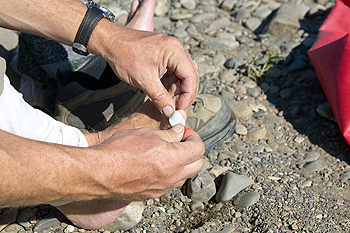 Hiking is a fun, safe, and healthy activity when proper precautions are taken. Here are some tips to help prevent foot injuries while out on the trails. Try not to overpack; take only what is necessary, as this can help take pressure off your feet. If you do go hiking, make sure to wear hiking boots as these are developed to offer more grip and cushioning than a sneaker. To prevent blisters, use moleskin, tape, or even bandages on areas where friction is likely. Wear moisture wicking socks to help keep your feet dry, further helping in the prevention of blisters. Finally, tools like hiking poles can help provide stability and take some weight off your back, so it's not a bad idea to bring a pair. By following these tips, you can help reduce the likelihood of falls and foot injuries. If you happen to hurt your feet while hiking, be sure to see a podiatrist so that you can be diagnosed and cared for properly.
Hiking is a fun, safe, and healthy activity when proper precautions are taken. Here are some tips to help prevent foot injuries while out on the trails. Try not to overpack; take only what is necessary, as this can help take pressure off your feet. If you do go hiking, make sure to wear hiking boots as these are developed to offer more grip and cushioning than a sneaker. To prevent blisters, use moleskin, tape, or even bandages on areas where friction is likely. Wear moisture wicking socks to help keep your feet dry, further helping in the prevention of blisters. Finally, tools like hiking poles can help provide stability and take some weight off your back, so it's not a bad idea to bring a pair. By following these tips, you can help reduce the likelihood of falls and foot injuries. If you happen to hurt your feet while hiking, be sure to see a podiatrist so that you can be diagnosed and cared for properly.
Blisters are prone to making everyday activities extremely uncomfortable. If your feet are hurting, contact Brent Harwood, DPM of Southeast Podiatry. Our doctor can provide the care you need to keep you pain-free and on your feet.
Foot Blisters
Foot blisters develop as a result of constantly wearing tight or ill-fitting footwear. This happens due to the constant rubbing from the shoe, which can often lead to pain.
What Are Foot Blisters?
A foot blister is a small fluid-filled pocket that forms on the upper-most layer of the skin. Blisters are filled with clear fluid and can lead to blood drainage or pus if the area becomes infected.
How Do Blisters Form?
Blisters on the feet are often the result of constant friction of skin and material, usually by shoe rubbing. Walking in sandals, boots, or shoes that don’t fit properly for long periods of time can result in a blister. Having consistent foot moisture and humidity can easily lead to blister formation.
Prevention & Treatment
It is important to properly care for the affected area in order to prevent infection and ease the pain. Do not lance the blister and use a Band-Aid to provide pain relief. Also, be sure to keep your feet dry and wear proper fitting shoes. If you see blood or pus in a blister, seek assistance from a podiatrist.
If you have any questions, please feel free to contact one of our offices located in Fairhope, Brewton, and Atmore, AL . We offer the newest diagnostic and treatment technologies for all your foot care needs.